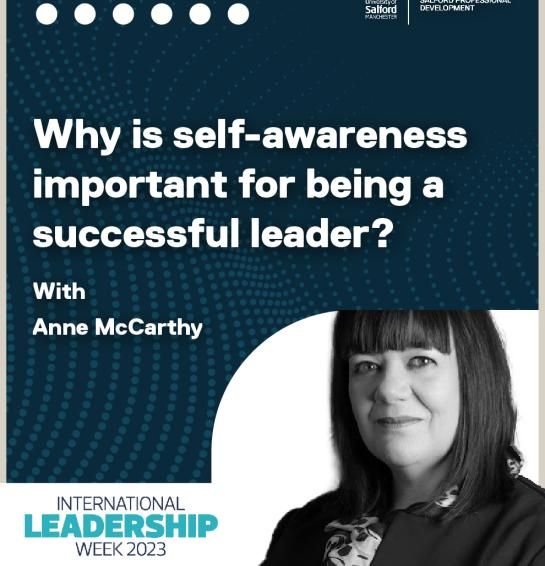Why is Self-Awareness Important for Being a Successful Leader?
Why is self-awareness important for being a successful leader?
As part of SPD’s support for International Leadership Week, we thought we’d take the time to sit down with one of our tutors, Anne McCarthy. Anne delivers on some of our most prestigious courses, including The Directors Leadership Programme and Women in Leadership Programme, to discuss what she believes it means to be a good leader, how we can all be effective leaders within our organisation, and why having self-awareness is at the centre of it all.
Anne starts by saying that leaders on leadership often emphasize the importance of understanding one’s own leadership style. Both leadership style and management style are vital to organisational life. The success of the enterprise depends on how well these roles are executed, with each requiring distinct leadership skills.
Professor Keith Grint tells us, she says, that some of the difference between leadership and management lies in the sorts of problems they resolve. Managers, with their specific management style, are dealing with problems that are familiar to us. He calls these ‘Tame’ problems. There is a best practice way of resolving them, or ‘taming’ them. The job of the manager is to encourage people to get the job done according to the known way.
Leaders on the other hand, with their unique leadership style, are dealing with ‘wicked problems’. A wicked problem is something we haven’t seen before and don’t know the answer to. Grint says the job of the leader is to reduce the anxiety of followers as they lead them into the unknown. I like this idea of a leader from Keith. It suggests that at the heart of leadership there is vision and change. Change is always unsettling and messy for people, and leaders need to call on their leadership skills of influence and persuasion to move towards the vision, with people contributing to the resolution of ‘wicked problems.’
So what does self-awareness have to do with being a successful leader?
The great Warren Bennis said that to lead, we must lead ourselves first. Certainly, I have seen this in my own work with leaders. Self-awareness is the gateway to leading with emotional intelligence. Daniel Goleman shows us that getting to know who we are involves being realistic about our strengths and areas for development, tuning in to how we are feeling, and understanding how that impacts our performance at work. It also means knowing your own inner resources, abilities, and limits, which are essential elements of an effective leadership style.
Are we all able to develop self-awareness?
We can all develop self-awareness, which is crucial for refining our leadership skills. Seeking out feedback is one way. The reality is that as you progress in an organisation, you get less feedback, so there is potential for your blind spots to increase. So, you must seek it out.
What are the best ways to do this within our organisation?
One way is to meet face-to-face with people who know you well at work and ask them how they see you as a leader. Invite appreciative feedback and ask for advice. Notice how their appraisal of your leadership style matches or differs from your own appraisal.
Self-awareness is also developed through reflection. In a time-poor world, this can be compromised. Leaders can make a choice to prioritise reflection. One way is to keep a journal. Getting into the habit of making an entry into a journal each day can help you make sense of the challenges at work. Over time, you will notice patterns, and this will allow you to make small tweaks to your leadership practice that will improve your performance. Perhaps you will have a big ‘Ah Ha’ moment that unlocks the answer to a problem you have been wrestling with. Reflection helps us understand our strengths, our energy, and our opportunities to improve.
A final important point that Anne wants us all to note is that leading yourself is also about keeping your energy at good levels. How do you refuel? The answer is different for each of us. The basics are about sleep and nutrition. It can also be about time to exercise, family time, time with friends, or time alone. Whatever it is, make sure you stop to refuel. It will make you more effective in applying your leadership style and management style in your organisation.



